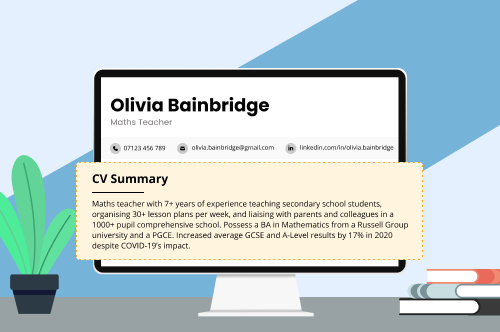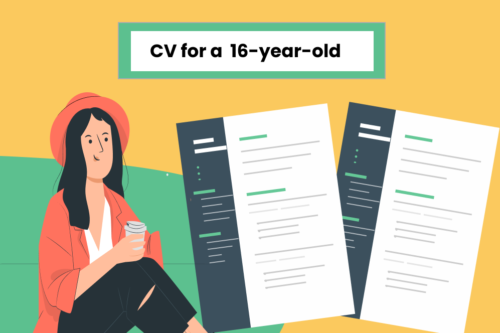Wondering why and how to add skills to your CV? Our careers expert Seb Morgan explains skills and how to put them on your CV in this video:
If you’d rather read about key CV skills (and see CV-ready examples) than watch a video, we have:
- good soft skills to list on your CV
- job-specific skills and CV-ready bullet points
- tips on how to make a CV skills section
- how to find even more skills for your CV
- frequently asked questions about CV skills
Good soft skills to list on your CV
As technology advancements take technical roles from humans, soft skills have become more valuable than ever. Here’s a quick explanation of what soft skills are:
Soft skills are personality traits that you use at your job, such as people skills and discipline. You can’t learn soft skills, but you can improve them. They’re the opposite of hard skills that you learn through practice and training — IT skills and language abilities, for instance.
These are the top soft skills employers are looking for on CVs in 2024:
What skills to put on your CV for specific jobs
Here’s a list of common skills to highlight if you’re writing your CV for a specific industry:
Finance
When you write your CV for a finance role, you could mention these good technical skills:
- Financial modelling
- Accounting software (QuickBooks, Xero)
- Auditing
- Budget management
- Tax software (like Accountsability)
Example of finance skills on a CV
- Oversaw a portfolio restructure that diversified investments and reduced risk, yielding a 12% return on investment in FY 20xx and outperforming the benchmark index by 5%
Engineering
These are good examples of skills for an engineering CV:
- Manufacturing processes
- Quality control
- Structural analysis
- Computer aided design (CAD)
- Documentation procedures
Example of engineering skills on a CV
- Led a cross-functional team in the redesign of a hydraulic system, achieving a 20% increase in efficiency and reducing production costs by £50,000 annually
Design
Even if you don’t work in a creative field, employers want to see that you can contribute unique ideas that help them innovate. Here are creative skills that recruiting managers look for on designer CVs in the UK:
- Sketching
- Photoshop
- Colour theory
- UI/UX design
- Branding
Example of design skills on a CV
- Conceptualised and executed a rebranding campaign, leading to a 35% uplift in brand engagement and contributing to a sales increase of £1.2 million within six months
Project management
Companies get ahead by streamlining their processes and getting products to market faster than their competitors. They need talented project managers to improve their efficiency. So if you have any of the skills below, emphasise them in your CV for project management work:
- Agile methodologies
- Productivity software (for example, Trello)
- Remote communication
- Negotiation techniques
- Knowledge of development processes
Example of project management skills on a CV
- Delivered a complex digital transformation project on time and £100,000 under budget, resulting in a 15% increase in operational efficiency and a 10% uplift in customer satisfaction scores
Marketing
If you’re looking for skills that’ll make your marketing CV stand out, here are some good options:
- Copywriting
- Social media platforms
- SEO tools (for example, Ahrefs)
- Content management tools (for instance, WordPress)
- Creativity
Example of marketing skills on a CV
- Orchestrated a multi-channel marketing campaign for DEF Brand, achieving a 30% rise in online engagement and driving sales growth of £750,000 within the first quarter of 20xx
Administration & office support
Applying for an administrative role? Here are some skills for an administrator CV to give you ideas for what to put on your own:
- Scheduling
- Data protection/GDPR compliance
- Budgeting
- Human resources practices
- Making travel arrangements
Example of administration skills on a CV
- Streamlined office processes and introduced a new digital filing system, reducing document retrieval times by 50% and saving the company an estimated £20,000 annually in labour costs
Research
Whether you’re writing an academic research CV or an entry-level marketing CV, showing good research skills will set you apart from other job applicants. Here are some of the key research skills recruiting managers will be impressed by:
- Data mining
- Search engine manipulation
- Database queries
- Interview techniques
- Speed reading
Example of research skills on a CV
- Conducted comprehensive research on nanoparticle drug delivery, resulting in 3 published papers, a 40% improvement in drug efficacy in pre-clinical trials, and securing £250,000 in grant funding for continued studies
Retail
Writing your CV for a retail job? Here are some skills that retailers look for when they review job applications:
- Inventory management
- Merchandising techniques
- Product display/presentation
- Point-of-sale (POS) system proficiency
- Adaptability
Example of retail skills on a CV
- Managed cash and credit transactions on a high-volume POS system, handling over £5,000 in sales per day with 0 discrepancies
Cleaner
If you’re looking to get hired as a cleaner, you’ll need to show skills like these on your cleaner CV:
- Cleaning techniques (for example, WC sanitisation)
- Attention to detail
- Stamina
- Self-motivation
- Relevant certifications (for example, your Level 5 Certificate in Cleaning)
Example of cleaning skills on a CV
- Led a team of 4 cleaners in a busy hospital, ensuring all areas were sanitised to meet health and safety standards, contributing to a 20% reduction in reported hygiene issues
Healthcare
In the UK, demand for healthcare skills is rapidly increasing. So skills like these are extremely valuable on your CV:
- Bedside manner
- NHS Constitution knowledge
- Charting and familiarity with Electronic Medical Records (EMR)
- Medical confidentiality and data protection
- Safeguarding
Example of health care skills on a CV
- Collaborated with multidisciplinary teams to develop and implement safeguarding plans for high-risk patients, contributing to a 25% decrease in safeguarding incidents over one year
Teaching
A good teacher CV emphasises skills like the following:
- National Curriculum
- Blackboard
- Disciplinary skills (e.g., behavioural intervention, parent-teacher communication)
- PSHE
- Lesson planning
Example of teaching skills on a CV
- Tailored English Language teaching methods to meet National Curriculum standards, boosting reading comprehension scores by 25% among Year 7 students
Waiter/barista
Need skills for your waiting staff or barista CV? Here are some examples of the skills you’ll see requested in job adverts for these positions:
- Point of sale (POS) system operation
- Latte art
- Good memory
- Hygiene/HACCP
- Wine pairing
Examples of waiting staff skills for a CV
- Conducted regular checks and maintained accurate records in line with HACCP requirements, leading to a 30% improvement in kitchen hygiene scores
How to make a CV skills section
Here are the steps you should follow when you’re building your CV skills section:
1. Research the skills the employer is looking for
The top skills for your CV are the ones requested in the job advert. Just look closely at the advert and note any skills mentioned there.
Here’s an example job advert with some of the skills the employer is looking for underlined:
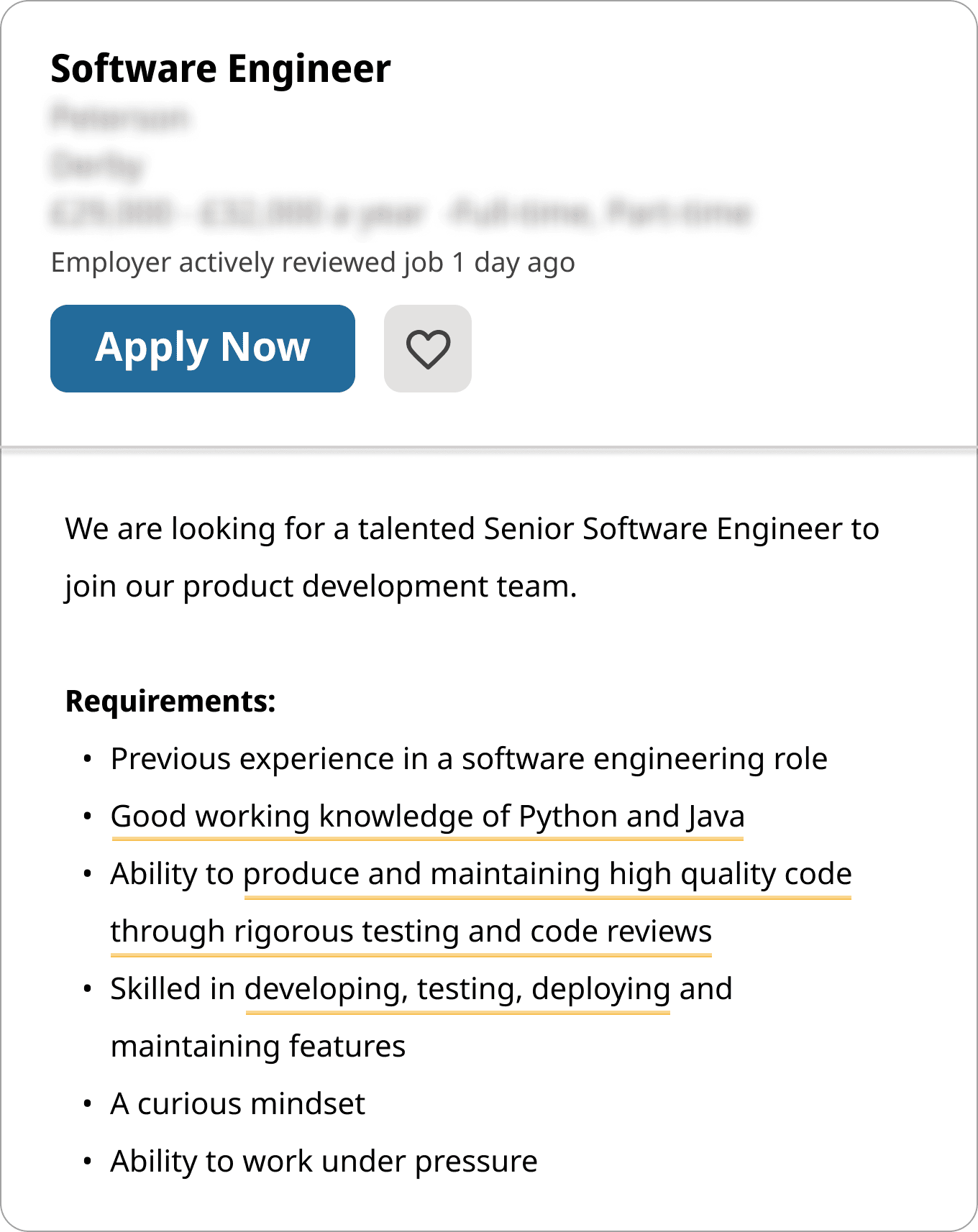
Once you’ve identified the skills that’ll make your CV stand out to the employer, it’s time to create a CV (and build a cover letter) that features them prominently.
2. Determine where on your CV to put your skills section
Don’t just plop your skill section in any random spot in your CV’s layout. Instead, think about where it will make the most impact. Base your decision on the role you’re targeting and your experience and ability.
For example, if you’re writing your first CV and don’t have much relevant experience, consider putting your skills section at the top (below your personal statement). Doing so shows the employer that while you’re not very experienced, you still have the abilities necessary to quickly learn and contribute.
Placing your skills section near the top of your CV is also a good idea if you work in a field that requires a highly technical skill set, as it immediately lets the reader know you have the abilities they need.
Alternatively, when your job-relevant work history is your top selling point, put your skills list somewhere after your work experience section.
3. Pick an appropriate key skills list format
When you write your skills section, think about the best way to format it. Depending on your situation, you can:
- Make a bulleted list of your skills, describing each in just a few words (‘Expert in Photoshop’)
- Categorise your skills in a list that uses internal headers (‘Marketing tools: Google Analytics, Mailchimp, Hootsuite’)
- Write a skills-based CV that lists your skills as headers and gives examples of how you’ve used them to succeed at work in a few bullets under the headers
Here are examples of how each type of skills section formatting looks in practice:
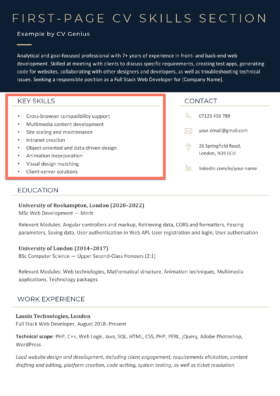
Bulleted Skills List
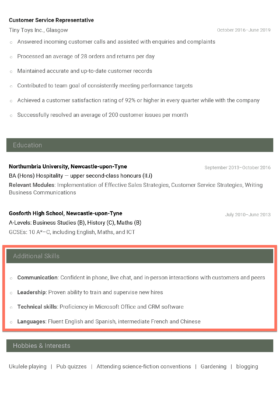
Categorised Skills List
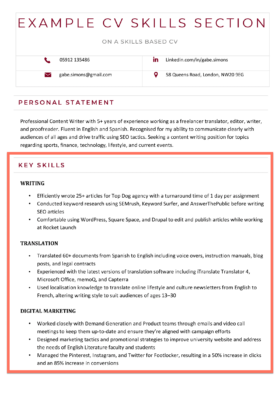
Skills-Based CV List
4. Give examples of the skills in your list throughout your CV
You should also back up the skills you’ve listed in your skills section with examples throughout your CV.
Start with your most important skills in your CV’s personal statement. Because the recruiting manager typically reads your personal statement first (as it’s at the top), you’ll want to ensure they can find your most job-relevant ability in this section.
Also, give examples of how you’ve used your skills to succeed on the job in your work history section. Doing so lets the recruiting manager measure your skill levels by seeing your CV achievements in a work context.
And if you don’t have a lot of experience to showcase on your CV, you should describe the skills you’ve developed at school or university by detailing coursework or extracurricular activities in your education section.
Finally, make a hobbies and interests section that indicates you develop and use skills relevant to your target role in your free time. For instance, if you’re applying for a food delivery job, you could note that you enjoy driving around town to run errands for your family.
To learn more about adding skills to specific sections of your CV, take a look at these resources on how to add skills to your:
- personal statement
- work history section
- education section
- extracurricular activities section
- hobbies and interests section
How to find more skills for your CV
Still unsure what skills you can put on your own CV? Follow these tips to identify relevant skills:
Research the skills required for similar jobs
If you still need other skills to put on your CV, look at job descriptions for similar job openings. These job descriptions will reveal skills applicable to the position you’re applying for.
For example, if you’re applying for a barista role at Coffee Republic, check out job descriptions for server roles at Costa Coffee and Pret A Manger.
Think about your previous experiences
Think of any other skills you’ve developed in previous jobs or university or school clubs that seem like a good fit for the position you’re going for.
For example, an entry-level position may not require presentation skills, but if you get the impression it’s a company that rapidly promotes talent, they could come in handy. You might want to add presentation skills to your CV in that case.
Look at good CV examples
Viewing CV examples from your industry is a great way to find skills you can include in your CV.
By looking at a CV examples for roles similar to your own, you can get an idea of the skills, qualifications, and work experience details other candidates in your field tend to put on their CVs.
Use online CV creation software
Overwhelmed by all our information? You can create your CV in mere minutes by answering a few questions about your experience, skills, and education.
Frequently asked questions about CV skills
Here are answers to four of the most common questions asked about adding skills to your CV:
- What skills should I put on my student CV?
- How do I talk about my skills in an interview?
- What is one skill anyone could acquire that is useful for your CV?
- How skilled do you need to be to claim a skill on your CV?
1. What skills should I put on my student CV?
While completing your studies, you can develop many transferable skills that you’ll be able to apply in the workplace. So when you write your student CV, include skills like these (if applicable):
- Research
- Attention to detail
- Networking
- Public speaking
2. How do I talk about my skills in an interview?
When talking about your skills in an interview, showcase how your skills and experience align with the job requirements and demonstrate how you can add value to the organisation.
Here are some tips to help you talk about your skills effectively in an interview:
- Research the company and the job description to understand the skills required for the role. This will help you to highlight your relevant skills during the interview.
- Provide specific examples of how you’ve used your skills in past jobs or experiences. Use the STAR method (Situation, Task, Action, Result) to structure your responses and provide concrete examples.
- Focus on the skills that are most relevant to the job and the company culture. Highlight how your skills can help the company achieve its goals.
- Use language that’s positive and confident. Avoid using negative language or underselling your skills.
- Prepare to answer questions about your strengths and weaknesses. Use your skills to frame your weaknesses as areas for growth and development.
3. What is one skill anyone could acquire that is useful for your CV?
u/disruptedgod asked this question:
One valuable skill anyone can learn and include on their CV is adaptability. In today’s work environment, the ability to adapt to new situations, learn new technologies, and embrace change is highly prized by employers.
Here’s how you could highlight adaptability on your CV:
Navigated three major departmental restructures within one year, seamlessly adapting to new roles and responsibilities while consistently exceeding key performance indicators by at least 15%
4. How skilled do you need to be to claim a skill on your CV?
/u/hellothere696969 asked this question:
For a skill to go on your CV, you should be good enough to use it at work on a daily basis. Always be honest about how well you can do it (lying on a CV never works out well), and choose skills that matter for the job you want.

